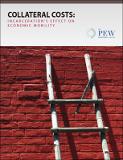| dc.description.abstract |
The inquiry of this report focuses on the intersection of incarceration and mobility, fields that might at first seem unrelated. We ask two questions: To what extent does incarceration create lasting barriers to economic progress for formerly incarcerated people, their families and their children? What do these barriers mean for the American Dream, given the explosive growth of the prison population? The findings in this report should give policy makers reason to reflect. The price of prisons in state and federal budgets represents just a fraction of the overall cost of incarcerating such a large segment of our society. The collateral consequences are tremendous and far-reaching, and as this report illuminates with fresh data and analysis, they include substantial and lifelong damage to the ability of former inmates, their families and their children to earn a living wage, move up the income ladder and pursue the American Dream. |

